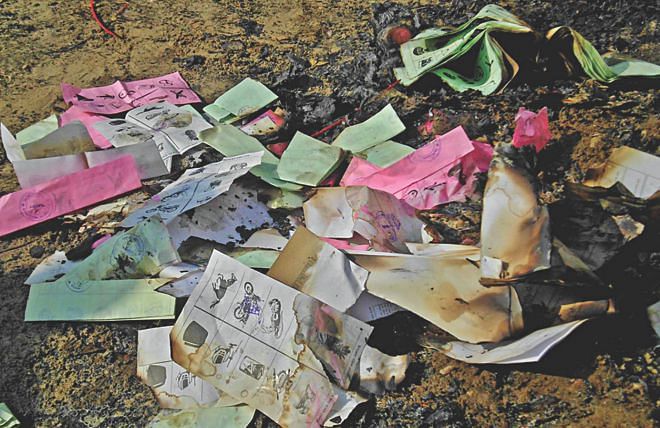An opportunity wasted
An opportunity wasted

THE UZ elections taking place in less than two months after the controversial 10th JS polls was a golden opportunity for the ruling party to restore the public's trust in the democratic process. Unfortunately, it did not happen that way. With ending of the first two phases the UZ elections did seem promising, but with rapid deterioration in law and order it faded. With the fourth phase coming to an end on the March 23 there is little scope for us to be optimistic. When we talk about the UZ elections 2014 with the final and fifth phase still to be held, the outcomes of it can certainly be a subject of discussion. But even a more important subject could be based on the question 'do the UZ elections provide any input into the viability of the democratic process?'
Firstly, it's the input into the viability of the democratic process which is going to be the yardstick against which the UZ elections will be assessed. Secondly, the way the five phases had proceeded under the management of the government, Election Commission (EC) and the law enforcing agencies.
Regarding the second point, I have noticed how progressively the public kept losing its trust in the sitting government and the EC along with the law enforcing agencies. A thing I want to add farther to this point is a kind of a planned inactivity by the mandated institutions like the EC and the local level administration. Apart from the two points, the incidence of violence with newer dimensions and deaths is another point that needs to be taken in account.
As far as the mandated institutions are concerned, they have failed miserably to act according to their respective authorities. Had they been able to send strong signals about dealing with anarchy and irregularities firmly then perhaps the election phases would have been more peaceful. They have failed either to cater to the political directions of the ruling party or to be in the good books of the government. It's an alarming sign as it throws Bangladesh back to the discredited election culture during the days of military and autocratic regimes of the eighties. More sadly the discredited culture has made a dramatic comeback under democratic rule.
As I followed the post-election statements of our CEC, after the completion of each phase, it appeared as if the EC itself was a party to the process of this discredited election culture. After having analysed the nature of vote casting in the centres, I must say that it does not matter how many centres were suspended as it is not an appropriate indicator for judging if the election was good or bad. But it's the inability of the EC to take proper and timely action that seemed questionable and dubious. In majority of skirmishes no action was taken.
In a situation like this official statistics are meaningless and not trustworthy. It was frustrating to have witnessed a presiding officer helplessly laughing as a ballot box was being snatched away from in front of him. The role of election observers from the civil groups (those who seemed so vibrant during the nineties) also appeared rather muted during the UZ elections too. Let's make this crystal clear. It can be said that only with mandated constitutional bodies one cannot ensure the viability of democratic process, unless these bodies assert their mandates effectively and independently.
I was baffled to hear an explanation regarding the CEC's absence by one of the government's advisors. Just because there is an EC, the government shouldn't think it has no role to play during an election. It was even more perilous when I saw the acting CEC and the government spokesperson both speaking in a manner as if nothing happened in the fourth phase of the elections. The current CEC along with the acting CEC seem to have the traits of the former controversial CEC Aziz. For a good few years the lineage of debatable CECs was absent, but now it has resurfaced.
There is enough reason for my fears to deepen as the UZ elections quickly near the end. With economic progress the people hoped that the rule of law would help to secure and safeguard democratic norms, but that's not happening. The promises that this government had made immediately after re-assuming power after the January 5 elections also seem like false promises.
On top of this, a very sad part of the 2014 UZ elections is that it is playing no role in strengthening the local government. There is no specific agenda regarding decentralisation too. So there is enough reason for one to be sceptical about its outcomes and elected candidates. Like before, the local government is likely to remain very loyal to the central government.
Overall, I would conclude by saying that the UZ elections of 2014 had cast a severe blow to the public's hope for continuation of the democratic process. Moreover, the UZ elections have been an opportunity horribly wasted by the ruling party for improving its reputation which had been greatly tarnished after the January 5 national polls.
Dr. Hossain Zillur Rahman is an economist and a former adviser to a caretaker government.